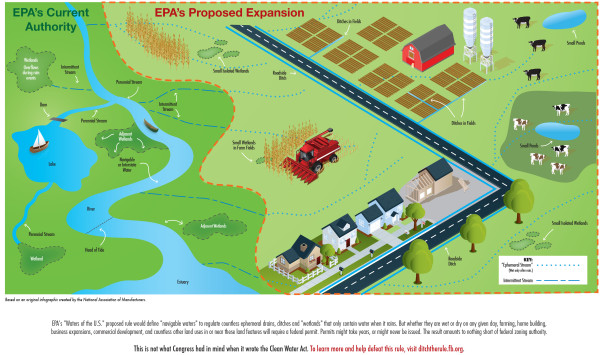Proposed EPA rule represents regulatory overreach, expert says

EXPANDED REACH: A new EPA rule, the Waters of the United States, would expand the agency’s regulatory reach
By Steve Wilson | Mississippi Watchdog
To its many foes, a rule proposed by the Environmental Protection Agency and U.S. Army Corps of Engineers that would redefine the scope of waters protected under the Clean Water Act is a real son of a ditch.
William Kovacs, the senior vice president of environment, technology and regulatory affairs for the U.S. Chamber of Commerce, said The Waters of the United States rule — an April provision that would enforce stricter pollution controls — represents a massive regulatory overreach and a chilling effect on entrepreneurs. He said the agency’s regulatory reach would expand from 3.5 million river and stream miles to 8.1 million under the new regulations.
“This rule would mean fewer entrepreneurs and fewer construction projects,” Kovacs said. “It’s difficult to start when you have to figure out this rule. There are going to be a lot of potential entrepreneurs who just won’t do it.
“It’s a power grab by the agency. It’s a classic case of mission creep. Their original mission was the reduction of pollutants, of which they’ve done a good job. This doesn’t pass the rationality test.”
The EPA rule — according to the U.S. Chamber of Commerce and the American Farm Bureau — would open a Pandora’s Box as Clean Water Act protections would be expanded to any land where flowing water leaves a mark, even if that water isn’t present most of the year. The EPA calls these features “ephemeral streams,” “wetlands” and “seasonal ponds.” The new rule would also cover man-made bodies like ditches, canals and ponds that drain into waters covered under the new rule.
In testimony in June before the House Subcommittee on Water Resources and Environment, American Farm Bureau Federation president Bob Stallman said the rule will present a new and costly legal hurdle for farmers and ranchers.
“EPA is deliberately misleading the regulated community about the impacts on land use,” Stallman said. “If more people knew how regulators could use the proposed rule to require permits for common activities on dry land, or penalize landowners for not getting them, they would be outraged.”
Another galling definition in the rule is what the EPA calls a significant nexus, which is defined as “a water, including wetlands, either alone or in combination with other similarly situated waters in the region significantly affects the chemical, physical, or biological integrity” of river, stream or ocean. Those “waters” don’t have to be present year-round or even natural to be regulated.
“If you’re going to develop a piece of property, you’re going to require a solid hydrologic survey to ensure that you don’t have a ditch, a pond or even a low area that has water during different times of the year that they have a chance to regulate,” Kovacs said.
DITCH THE MYTH: This slide is part of the Environmental Protection Agency’s campaign to fight detractors of its new Waters of the United States rule, which would expand the agency’s reach.
The EPA claims it’s only clarifying existing regulations with the new rule.
Two Supreme Court decisions — Solid Waste Authority of Northern Cook County v. U.S. Army Corps of Engineers in 2001 and Rapanos v. United States in 2006 — addressed the EPA’s jurisdiction under the Clean Water Act. The first decision overturned an EPA rule that governed isolated waters “which are or would be used as habitat by… migratory birds that cross state lines.”
The second ruling was a bit more vague, as four conservative justices wanted a more restrictive interpretation of the term “navigable waters” under the Clean Water Act.
The debate is only heating up, as the EPA announced it would expand the comment period for a second time to Nov. 14 after previously expanding it from June into October.
The debate has even spilled out onto the web. The EPA has mounted a public information campaign called Ditch the Myth, urging readers to “tweet the truth” about the new rule, while the Farm Bureau has countered with its Ditch the Rule campaign.
Get regular updates on Mississippi through our Facebook or Twitter accounts







